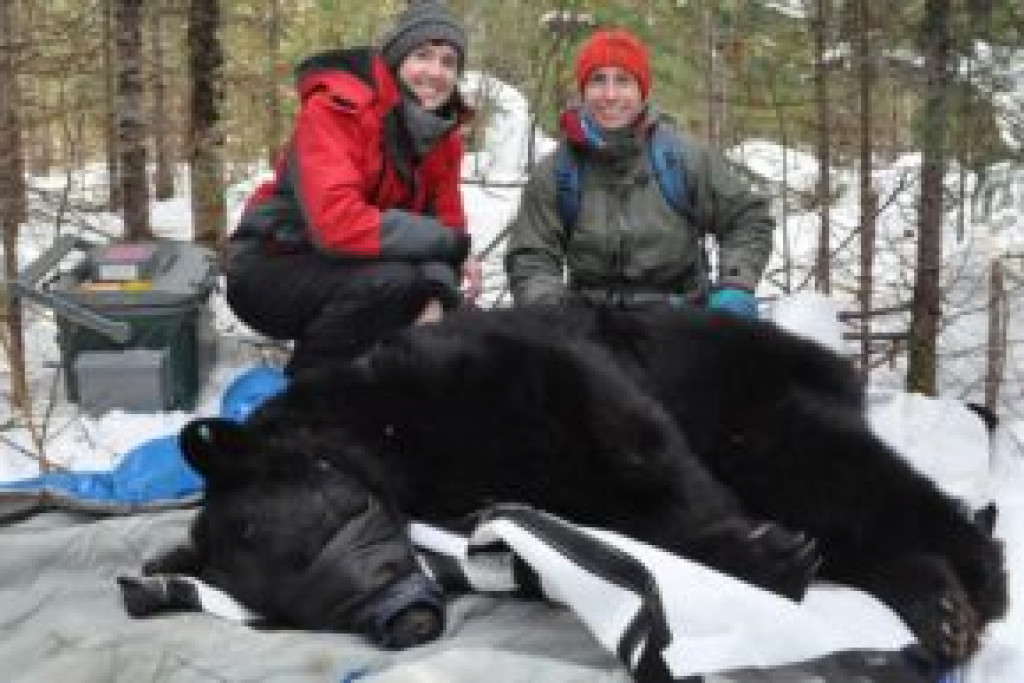
NMU Scientists Publish U.P. Bear Research December 3, 2020
In recent decades, researchers have found that most mammals’ guts are surprisingly complex environments—home to a variety of microbial ecosystems that can profoundly affect an animal’s well-being. A Northern Michigan University alumna and her faculty mentor are among scientists who have now learned that the American black bear appears to be an exception. Its simple gut hosts a microbial population that varies little across the intestinal tract.
“It’s the first mammal species where we’ve looked at two separate locations in the gut and found microbial communities that are essentially indistinguishable from each other,” said Sierra Gillman (’20 MS), first author of the study published in Scientific Reports.
Gillman did the research in the Upper Peninsula while a grad student, working with NMU wildlife ecology assistant professor Diana Lafferty. She is now pursuing a doctorate at the University of Washington.
Earlier limited research on microbial ecosystems in black bears focused on animals in captivity. Because animals in the wild often have very different gut microbiomes, the researchers were curious as to what they’d find. One major challenge was obtaining samples out in the field.
Working with U.P. hunting guides, Gillman developed a detailed set of protocols and conducted training sessions on how to collect samples from bears harvested during regularly scheduled hunting trips. Specifically, she taught them how to retrieve samples from both the jejunum, which is the middle section of the small intestine, and the colon, which is also called the large intestine.
The researchers obtained about 30 usable samples of each and analyzed all to identify which microbial species were present. They expected to see more, and different, species of microbes in the colon. The colon is often where digestion slows down, enabling gut microbes to break down fiber in the diet, which normally fosters microbial diversity. But that is not apparently true for the black bears of Michigan.
Why are bear gut microbiomes different from the microbiomes of other omnivores scientists have looked at? In a word, it’s probably the cecum.
Omnivores with more complex guts have a small pouch – called the cecum – between the small and large intestine. The cecum helps slow down the rate at which food passes through the gut, like an oxbow in a river, and likely serves as a reservoir for microbial populations in the gut, allowing animals to replenish the diversity of their microbiomes, even as their diets and health change.
“Bears don’t have a cecum,” Gillman says. “That makes their gut microbiomes more vulnerable to systemic change due to diet, health or other factors.”
This finding has an immediate practical application for wildlife researchers.
“In many animal species, a fecal sample can tell you what the microbial diversity of the colon was like – but it doesn’t tell you much about what’s happening in other parts of the gut,” says Diana Lafferty, co-author of the paper and an assistant professor of wildlife ecology at NMU. “Our work suggests that a fecal sample offers insight into the microbial community across the entire gut for black bears – and possibly for other carnivores and omnivores that have simple gut morphologies.”
Another coauthor of the Scientific Reports paper was Erin McKenney, assistant professor of applied ecology at North Carolina State University.
“Bears have really simple guts—pretty much a garden hose—so they can’t regulate their gut microbes to the extent that animals with longer, more complex guts can,” said McKenney. “It raises some interesting evolutionary questions about the relationship between the shape of an animal’s gut, its gut microbiome, and the relationship between the microbiome and the animal’s health and behavior.”
Their work was supported by the National Science Foundation (NSF) and by Sigma Xi, the scientific research honor society.
As an NMU master’s student, Gillman became the university’s first recipient of an NSF Graduate Research Fellowship, one of the most prestigious awards available to students in the STEM disciplines who are pursuing research-based master’s and doctoral degrees in the United States.
The fellowship supported her thesis project, “Human foods in a wild carnivore’s diet: micro-changes with macro-consequences.” She also won first place among graduate students for a related research poster presentation at NMU’s 2019 Celebration of Student Scholarship. Read the previous story here.
North Carolina State University contributed content for this story.
The post NMU Scientists Publish U.P. Bear Research December 3, 2020 first appeared on Broadcast-everywhere.net.

Comments (0)